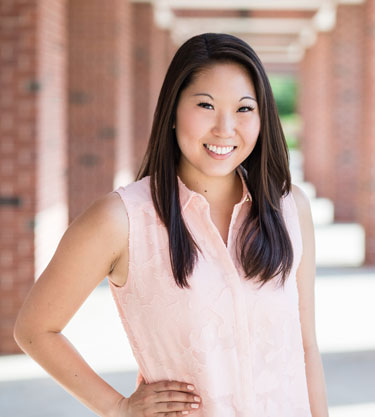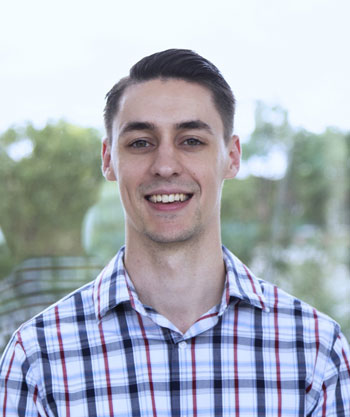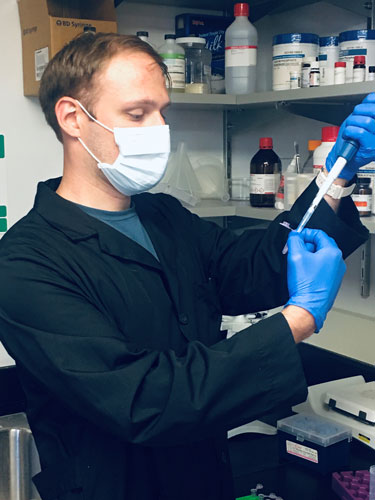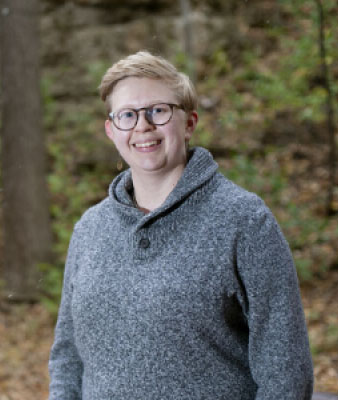When the pandemic forced research labs to shutter across campus this spring, a group of graduate students sought to help address the crisis by volunteering with the University of Iowa’s State Hygienic Lab. Representing a variety of programs, these students were similarly motivated to help and played crucial roles in the initial setup of the lab and validation of testing methods. One student even chose to forego their PhD program to instead master out and take a full-time position with SHL.

Emily Steinbach, a PhD candidate in Free Radical and Radiation Biology, wanted to help address the pandemic as the crisis unfolded. As COVID-19 shuttered smaller, more focused research labs across campus – including her own – she found her calling to respond to requests of help from the University of Iowa’s State Hygienic Lab (SHL).
Steinbach and several other graduate students answered the call for volunteers to assist with ramped up research testing. She was uniquely positioned, having worked with kidney disease and cancer patients in her academic lab, both of which groups are immunocompromised and particularly vulnerable to the coronavirus. Steinbach also had another, more personal connection to the science: she happens to be immunocompromised. She hoped to alleviate stress for others in similar positions by ensuring they have easy access to testing and could know whether or not they have the virus.
“When you’re immunocompromised, you always have a fear of getting the seasonal flu or catching stomach bugs and things like that,” says Steinbach. “When you think about something as severe and contagious as a global pandemic, it almost gives you a fear of being able to live your life.”
Steinbach was one of the first to volunteer on SHL’s original validation team, which sought to confirm the accuracy and reliability of the lab’s testing methods for COVID-19. Validation was necessary before the lab could begin processing coronavirus tests for patients, with the SHL team using samples from both the CDC and Test Iowa for cross-analysis.
“Validations for tests are things we do all the time in radiation oncology and periodical radiation biology,” says Steinbach. “Most of the time we are focused on cancer and being able to track tumor growth or changes in kidney function, so it was a similar task in that we were just looking for a different kind of clinical marker with COVID.”
Steinbach is primarily involved with the processing aspect of the process. Among other things, she has helped set up the system for keeping track of patient samples and prepared samples for subsequent testing in the extraction stage.

Ryan Callahan, a master’s student in Microbiology, began volunteering as a member of the validation team at the same time and was involved in the extraction stage. He was charged with extracting RNA from patient samples, which is the genetic material of COVID-19.
Callahan felt compelled to help during the pandemic and similarly felt volunteering with SHL testing was the best way to use his skills. It has also allowed him to apply the research skills he has learned through his scholarship to a clinical setting.
“We didn’t know when we started that it was going to work definitively, and we found out quickly that there were things that needed to be modified and fixed,” says Callahan. “Just having to troubleshoot my own experiments in the lab was an invaluable experience when it comes to something like this – where it works, but we can make it better.”
Procedures like RNA extraction or PCR (polymerase chain reaction) are commonly used in his microbiology program. Beyond honing his scientific skills, he has appreciated gaining more experience with techniques like these, as well as being able to work in a diverse lab and connecting with people from a variety of backgrounds.
“It’s been great to meet some of the other people helping out with the Test Iowa platform,” says Callahan. “A lot of them are coming from the university, but they’re not people I would normally interact with because we’re in different departments. It’s been cool to work with a team where we all have very different backgrounds, but we’re all focused on the same goal.”
The expertise of staff at the lab varies widely, as do the studies of the graduate students volunteering. Timothy Skog, a PhD candidate in Neuroscience, rounded out the group of graduate students volunteering on the original validation team. Like his peers, Skog wanted to help in some way during the pandemic and felt his research background made him well suited to volunteer with COVID-19 testing.

“When I have the experience that’s needed and there’s definitely a demand for it, I thought I should help out any way I could,” says Skog. “Even if I’m just pipetting all day, it’s still helping out all these people affected by the pandemic who want to know if they have it or not. It’s contributing to the public health of the country and keeping the virus at bay.”
Skog’s volunteer work with SHL has been in the PCR stage. This involves isolating a certain segment of RNA, replicating it, and expanding. If the segment amplifies, that indicates it is a positive test for COVID-19 RNA; if it does not amplify, the sample tests negative. The validation team was developing a probe for COVID-19 in this stage and this assay was one of the things Skog focused on.
Although scientific assays typically take months to validate, the team set out to complete this one in just a couple weeks. This meant he and the other graduate students put in quite a few hours at the lab – even some eighteen-hour shifts.
“We ended up committing a lot of hours,” says Skog. “Then when we had pared down and stepped back again once things got rolling, we noticed how exhausted we were. But, during the time, I don’t think we really noticed that we were running on adrenaline for those two weeks.”
While Skog’s volunteer work connects with certain aspects of his Neuroscience program, he sees it as providing more general experience in setting up a research lab and validating tests to be accurate and reliable. It has also made him reconsider the public health sector as a potential career path to pursue when he completes his PhD program.
For another graduate student, volunteering has already led them to begin a career in the public health sector. Murphy Keller, a graduate student in Immunology, has accepted a full-time position with SHL as a result of their volunteer efforts with COVID-19 testing.
Keller had been pursuing their PhD when their university research lab was forced to shut down in March. They felt the need to help address the pandemic in some way and viewed COVID testing with SHL as the best way to use their expertise. With their dissertation project research stalled, Keller was grateful to resume a research role at the state lab.

“Getting started in the lab was big for me mentally,” says Keller. “I had been stuck in my apartment, getting increasingly frustrated at being unable to do anything productive. Being able to go in – even just on the volunteer basis for a few days a week – and actually helping the situation in some way was so big. I am so glad that I started that.”
Keller’s research background quickly came in handy at SHL. During one of the first onboarding meetings, they were singled out as one of the students trained to work with blood borne pathogens already. They were immediately pulled aside and fast-tracked into their unique volunteer position.
While Keller was happy to play an important role in COVID-19 testing, they were concerned about losing momentum on their dissertation research project and not knowing when it would be safe to return to their academic lab. After their department supervisor offered them a full-time position at SHL with a one-year contract, Keller decided to accept the position and opted to master out of their Immunology program, forgoing a full PhD. The transition appears to align well with Keller’s career goals and interests.
“Coming out with a master’s degree and a full year’s experience in a joint university-state institution – that’s a good place to be, especially if your career goals aren’t set on becoming a professor anyway,” says Keller.
Keller has worked full-time at SHL since June. They have continued to work on their master’s thesis and will complete this process in August. With the end of their program in sight, Keller is excited to focus on their work with SHL and their career interest in science communication.
As the students continue their work at the state lab, they reflect on how valuable the experience has been for them. They are grateful for the warm welcome and support they received from the staff – even the SHL Director, Michael Pentella, checked up on them regularly. In addition to learning a great deal from this unique research opportunity, they can all take pride in having been a crucial part of the response to a once in a lifetime pandemic.
“Testing is obviously important and it’s something we direly need, so to actually get to play a part in that has been great,” says Callahan. “Especially being in an academic setting where you’re doing more fundamental research, getting the opportunity to do something in a more clinical and diagnostic setting has been exciting.”